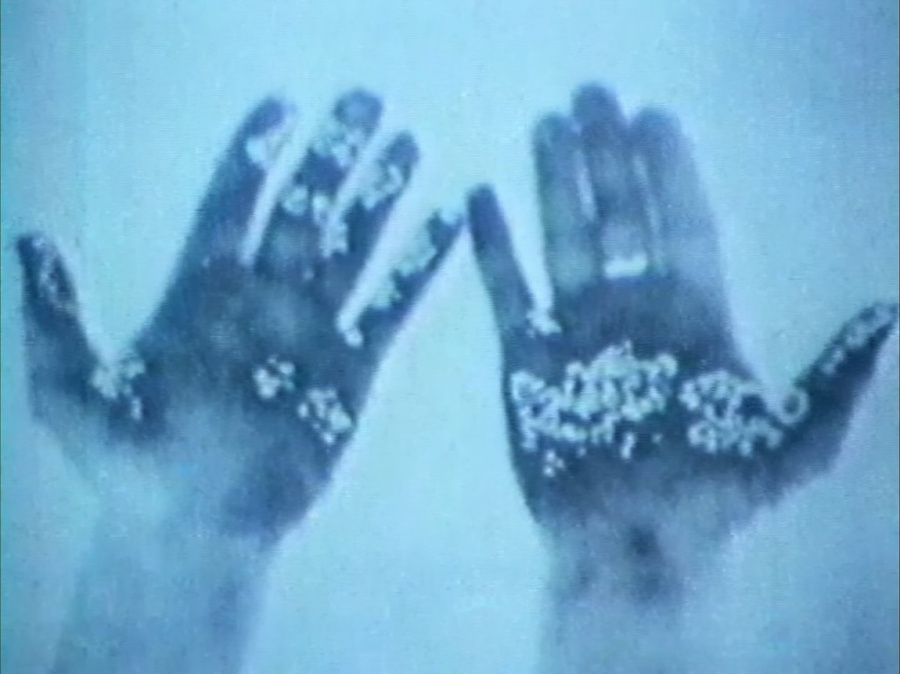Iluminace 2024, 36(2):71-78 | DOI: 10.58193/ilu.1782
Techniky a technologie na kompenzaci bezmoci
- Vysoké učení technické v Brně, Česká republika ✉

The video essay Techniques and Technologies to Compensate for Powerlessness is an artistic research output that exemplifies Matěj Pavlík’s approach to historiography, developed through individual projects and interdisciplinary collaborations. Pavlík’s work often focuses on a reflexive approach to fiction, speculation, or myth-making. In this essay, the artist examines the role of borderline science technologies invented in late socialist Czechoslovakia. These technologies (e.g., telesthesia, healing, and locating geopathogenic zones) were linked to research in borderline scientific fields like psychotronics and psychoenergetics. The artist critically analyzes these technologies, highlighting their socio- political and economic contexts. Pavlík suggests that these technologies were responses to the specific crises of high modernity, compensating for feelings of alienation or powerlessness. How can we grasp these techniques and technologies in the present? He hypothesizes that the emergence and proliferation of these borderline scientific practices, particularly healing, in late socialist Czechoslovakia might reflect the era’s disillusionment and the failure of Marxist ideals of emancipation. The attempt to treat individuals and the public space at the hands of the late socialist healer may thus have been a way to individualize social risks and harms. Throughout the video essay, Pavlík argues that the institutionalization of these „wondrous“ techniques and technologies was an attempt to inhabit and adapt to the so-called pharmakon of late modernity: the poison and cure called the Scientific and Technological Revolution.
Klíčová slova: historiografie, fikce, socialismus, léčitelství, marxismus, odcizení, hraničně vědecká technologie
Techniques and Technologies to Compensate for Powerlessness
Keywords: historiography, fiction, socialism, healing, Marxism, alienation, borderline science technology
Vloženo: 28. únor 2024; Přijato: 3. září 2024; Zveřejněno: 8. listopad 2024 Zobrazit citaci
Stáhnout citaci
Reference
- Bartlová, Milena. "Bod zlomu: Svět jako balíček karet", Artalk, 2022, cit. 3. 8. 2024, https://artalk.info/news/bod-zlomu-svet-jako-balicek-karet.
- Drbal, Karel - Zdeněk Rejdák, eds. Perspektivy telepatie (Praha: Melantrich, 1970).
- Gardavský, Zdeněk. Problém geopatogenních zón jako architektonický a urbanistický fenomén (Brno: SÚRPMO Brno, 1984).
- Kopeček, Michal, ed. Architekti dlouhé změny: Expertní kořeny postsocialismu (1980-1995) (Praha: Argo, 2019).
- Král, Miloslav. Kosmická paměť: Hledání smyslu kosmu a člověka (Olomouc: Nakladatelství Dobra & Fontána, 2002).
- Magid, Václav. "O neuchopitelnosti: v čem (ne)spočívá romantismus současného umění", Art and Antiques, 2022, cit. 3. 8. 3024, https://www.artantiques.cz/o-neuchopitelnosti-v-cem-ne-spocivaromantismussoucasneho-umeni.
- Märc, Vojtěch. "Města na kraji nemocnic: Geopatogenní zóny jako architektonický a urbanistický fenomén", Sešit pro umění, teorii a příbuzné zóny, č. 30 (2021), 35-93.
- Mervart, Jan - Jiří Růžička. "Rehabilitovat Marxe!": Československá stranická inteligence a myšlení poststalinské modernity (Praha: Nakladatelství lidové noviny, 2020).
- Rejdák, Zdeněk. "Psychotronics: The State of Art", Impact of Science on Society 24, č. 4 (1974), 285-289.
- Richta, Radovan, a kol. Civilizace na rozcestí (Praha: Nakladatelství Svoboda, 1966).
- Sommer, Vítězslav, a kol. Řídit socialismus jako firmu: Technokratické vládnutí v Československu (1956-1989) (Praha: Nakladatelství lidové noviny, 2019).
Tento článek je publikován v režimu tzv. otevřeného přístupu k vědeckým informacím (Open Access), který je distribuován pod licencí Creative Commons Attribution 4.0 International License (CC BY 4.0), která umožňuje distribuci, reprodukci a změny, pokud je původní dílo řádně ocitováno. Není povolena distribuce, reprodukce nebo změna, která není v souladu s podmínkami této licence.


